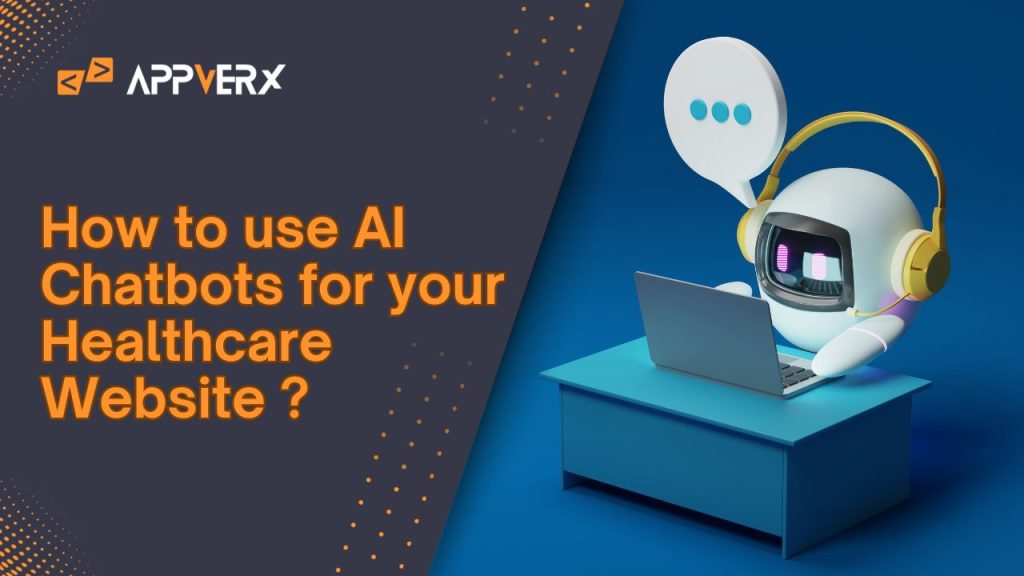Artificial intelligence (AI) chatbots have transformed the healthcare industry. This article explores the ins and outs of incorporating AI chatbots into your healthcare website to enhance patient experience and streamline processes.
Introduction
A significant advancement in patient care is the integration of AI chatbots into healthcare websites. They provide information, offer assistance, and engage users, ultimately contributing to the efficiency of healthcare.
What is a Healthcare Chatbot?


A healthcare chatbot is a computer program simulating user conversations using artificial intelligence. In healthcare, these chatbots can perform various tasks, from answering general queries to assisting with complex medical information.
Benefits of AI Chatbots in Healthcare
1. Improved Patient Engagement
AI chatbots have the primary advantage of improving patient engagement in healthcare. These virtual assistants create an interactive and personalized experience for users, making them more likely to participate in their healthcare journey actively.
2. 24/7 Accessibility
Unlike traditional healthcare services with limited operating hours, AI chatbots provide round-the-clock accessibility. Patients can seek information and assistance anytime, enhancing satisfaction and a sense of convenience.
3. Streamlined Appointment Scheduling
Scheduling doctor appointments can take time and effort. AI chatbots streamline this task by offering a user-friendly interface for appointment booking, reducing the administrative burden on patients and healthcare providers.
Ways to Use a Chatbot in Healthcare
Incorporating chatbots into healthcare websites opens up many possibilities for improving patient care. Let’s delve into specific use cases where these AI-powered virtual assistants can significantly impact.
1. Appointment Scheduling
Chatbots can be used to simplify appointment scheduling in healthcare, which is one of their most beneficial applications. Appointments can be quickly booked, availability can be checked, and timely reminders can be sent, reducing the likelihood of patients missing appointments and improving the efficiency of healthcare providers.
2. Symptom Checking and Diagnosis
Chatbots equipped with advanced algorithms can assist users in assessing their symptoms. While they don’t replace professional medical advice, these chatbots can provide preliminary information, helping users decide whether to seek immediate medical attention or schedule a consultation.
3. Medication Reminders
Adherence to medication plans is crucial for patient health. Chatbots can send personalized reminders to ensure patients take their medications as prescribed. This fosters better health outcomes and contributes to a proactive approach to managing chronic conditions.
AI Chatbots in Healthcare: A Game Changer
Integrating AI chatbots into the healthcare sector goes beyond convenience; it’s a game-changer for patients and healthcare providers.
1. Enhancing Patient Experience
AI chatbots contribute to a more positive patient experience by providing instant responses to inquiries, reducing wait times, and offering personalized interactions. Providing healthcare this way fosters trust and engagement, which are fundamental to effective care.
2. Reducing Administrative Workload for Healthcare Providers
Healthcare professionals often face overwhelming administrative tasks. Healthcare providers can focus more on patient care by using chatbots to answer routine questions, schedule appointments, and enter data.
Use of Chatbots in Healthcare:
Real-world examples highlight the practical benefits of incorporating chatbots into healthcare websites.
Virtual Health Assistants
Leading healthcare institutions have successfully implemented virtual health assistants to provide users instant access to medical information, resources, and personalized wellness tips, enhancing the overall healthcare experience.
Remote Patient Monitoring
Chatbots are increasingly being used for remote patient monitoring, allowing healthcare providers to keep track of patients’ vital signs and health data in real-time. This facilitates proactive interventions and timely adjustments to treatment plans.
Post-Discharge Follow-ups
Post-discharge care is a critical phase in a patient’s recovery. Chatbots can play a role in post-discharge follow-ups, providing patients with information on recovery protocols medication adherence, and addressing any concerns they may have.
Challenges and Solutions
Implementing AI chatbots in healthcare has challenges, but proactive measures can address these issues and ensure the successful integration of this transformative technology.
Privacy Concerns
In the healthcare industry, privacy is of the utmost importance. Chatbots must follow regulations regarding data protection. Implementing robust encryption, secure data storage practices, and regular security audits can help mitigate privacy concerns and build trust among users.
Ensuring Accurate Medical Information
The accuracy of medical information provided by chatbots is critical. Regular updates to the chatbot’s knowledge base, integration with reputable medical databases, and collaboration with healthcare professionals for content validation are essential steps in maintaining the reliability of information.
Overcoming Technical Limitations
Technical glitches and limitations can hinder the seamless functioning of chatbots. Continuous monitoring, regular software updates, and responsive technical support are crucial for resolving issues promptly and ensuring a smooth user experience.
How to Implement a Healthcare Chatbot
Successfully implementing a healthcare chatbot involves strategic planning and attention to key considerations.
1. Choosing the Right Platform
Selecting a user-friendly and scalable platform is essential. The chosen platform should align with the specific needs of the healthcare website, ensuring a seamless integration process and optimal performance.
2. Integration with Existing Systems
Compatibility with existing healthcare systems is vital for a chatbot’s effectiveness. Integration should be seamless, allowing the chatbot to access relevant patient information and respond accurately.
3. Ensuring Regulatory Compliance
Adherence to healthcare regulations is non-negotiable. Healthcare chatbots must comply with industry standards and legal requirements to safeguard patient information and maintain the trust of both users and regulatory bodies.
Chatbot Use Cases in Healthcare
The versatility of chatbots in healthcare is evident through various use cases that cater to different aspects of patient care.
1. Virtual Health Assistants
Virtual health assistants act as knowledgeable companions for users, offering information on symptoms, general health advice, and wellness tips. In addition to educating users about health, they enable them to make informed health decisions.
2. Remote Patient Monitoring
Using chatbots to collect and analyze real-time health data is crucial to remote patient monitoring. This enables healthcare providers to proactively intervene if any deviations from the patient’s health parameters, facilitating early intervention and personalized care.
3. Post-Discharge Follow-ups
After a patient is discharged, a chatbot can provide follow-up care instructions medication reminders, and answer post-discharge queries. This continuous support aids in a smoother recovery process and reduces the likelihood of readmissions.
Doctor Appointment Chatbot
Scheduling doctor appointments can be cumbersome, but with a dedicated chatbot, this task becomes streamlined and user-friendly.
Simplifying the Appointment Process
A chatbot can guide users through the appointment scheduling process, asking necessary questions such as preferred date and time, type of appointment, and any specific concerns. Patient and healthcare provider time is saved, and user experience is improved.
Reducing No-Shows Through Reminders
Chatbots can send automated reminders to patients about upcoming appointments, reducing the number of no-shows. This contributes to better time management for healthcare providers and ensures patients receive the care they need promptly.
Designing a User-Friendly Healthcare Chatbot
The success of a healthcare chatbot hinges on its user interface and the overall experience it provides users.
Importance of an Intuitive Interface
An intuitive and user-friendly interface is crucial for a healthcare chatbot. Users, including those with varying technological proficiency, should be able to navigate the chatbot effortlessly. Users experience a positive experience when clear instructions and conversations flow logically.
Customization for Different User Demographics
Healthcare is diverse, and patient demographics vary. A well-designed chatbot should be customized to cater to different user groups, ensuring that the interactions are personalized and relevant to the user’s needs.
Future Trends in AI Chatbots for Healthcare
The landscape of healthcare chatbots is continually evolving, with exciting advancements on the horizon.
Integration with Telemedicine
Telemedicine platforms will be seamlessly integrated with healthcare chatbots in the future. Users may soon be able to consult with healthcare professionals directly through chatbots, combining the convenience of virtual consultations with the efficiency of AI-driven interactions.
Advancements in Natural Language Processing (NLP)
In the future, chatbots can understand and respond to complex medical queries even better as natural language processing technology advances. This will enhance the conversational capabilities of healthcare chatbots, making interactions with users more realistic and productive.
Overcoming Resistance to Chatbot Adoption
Despite the evident benefits, some resistance to adopting chatbot technology in healthcare persists.
Educating Healthcare Professionals
Healthcare professionals may initially be hesitant to embrace chatbots. Providing comprehensive training on chatbots’ capabilities, limitations, and benefits is crucial in gaining their trust and encouraging active participation in the integration process.
Addressing Patient Concerns
Patients may have concerns about the reliability of information provided by chatbots or the potential replacement of human interaction. Open communication about the supplementary nature of chatbots, their role in enhancing healthcare services, and the ongoing presence of human professionals is essential in alleviating these concerns.
Evaluating the ROI of Healthcare Chatbots
Understanding the return on investment (ROI) is vital for healthcare organizations considering the adoption of chatbot technology.
Quantifying the Impact on Patient Satisfaction
Measuring the impact of chatbots on patient satisfaction is a crucial aspect of evaluating ROI. Surveys, feedback mechanisms, and monitoring user engagement can provide valuable insights into how chatbots contribute to the overall patient experience.
Analyzing Time and Cost Savings for Healthcare Providers
Healthcare providers stand to benefit significantly from chatbot implementation in terms of time and cost savings. Analyzing the reduction in administrative workload, improved appointment scheduling efficiency, and overall operational enhancements helps quantify the tangible benefits for healthcare organizations.
Conclusion
In conclusion, integrating AI chatbots into healthcare websites presents a transformative opportunity to enhance patient care, streamline processes, and embrace the future of healthcare technology. As the industry evolves, staying abreast of these advancements and proactively adopting chatbot solutions can position healthcare providers at the forefront of innovation.
FAQs
Q: Are AI chatbots secure for handling sensitive medical information?
A: Absolutely. AI chatbots in healthcare adhere to stringent security measures to ensure the confidentiality of patient data.
Q: Can chatbots replace human doctors?
A: No, chatbots are designed to complement human healthcare providers, offering support and assistance but not replacing the expertise of medical professionals.
Q: How can healthcare websites ensure the accuracy of information provided by chatbots?
A: Regular updates and integration with reliable medical databases help maintain the accuracy of information provided by healthcare chatbots.
Q: Are AI chatbots cost-effective for small healthcare practices?
A: AI chatbots can be particularly cost-effective for small practices, reducing administrative costs and improving operational efficiency.
Q: What training is required for healthcare professionals to integrate chatbots into their practice?
A: Training programs are available to help healthcare professionals understand and effectively use chatbots, ensuring a smooth integration process.
Q: Can patients trust the diagnosis provided by a healthcare chatbot?
A: Healthcare chatbots are designed to provide general information and support. For accurate diagnosis, consultation with a qualified healthcare professional is essential.
Q: How customizable are healthcare chatbots to suit different medical specialties?
A: Healthcare chatbots can be customized to cater to the specific needs of different medical specialties, ensuring relevance and accuracy.
Q: What role do chatbots play in post-discharge care?
A: Chatbots can facilitate post-discharge care by providing follow-up information, medication reminders, and answering patient queries to ensure a smooth recovery process.


